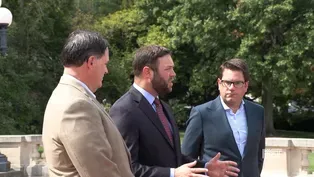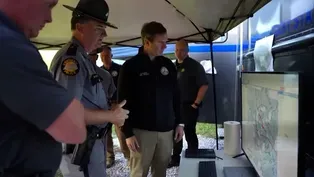
NKU President
Clip: Season 3 Episode 74 | 7m 17sVideo has Closed Captions
A one-on-one interview with NKU's president.
Northern Kentucky University serves more than 15,000 students, many of them are first generation students and of non-traditional age. Renee Shaw sits down with NKU's seventh president, Cady Short-Thompson, about their mission and recent decision to dissolve the diversity office.
Problems with Closed Captions? Closed Captioning Feedback
Problems with Closed Captions? Closed Captioning Feedback
Kentucky Edition is a local public television program presented by KET

NKU President
Clip: Season 3 Episode 74 | 7m 17sVideo has Closed Captions
Northern Kentucky University serves more than 15,000 students, many of them are first generation students and of non-traditional age. Renee Shaw sits down with NKU's seventh president, Cady Short-Thompson, about their mission and recent decision to dissolve the diversity office.
Problems with Closed Captions? Closed Captioning Feedback
How to Watch Kentucky Edition
Kentucky Edition is available to stream on pbs.org and the free PBS App, available on iPhone, Apple TV, Android TV, Android smartphones, Amazon Fire TV, Amazon Fire Tablet, Roku, Samsung Smart TV, and Vizio.
Providing Support for PBS.org
Learn Moreabout PBS online sponsorshipAll this week, we brought you stories about northern Kentucky that's home to 400,000 people.
The higher education institution that helps drive the region of northern Kentucky is Northern Kentucky University.
It serves more than 15,000 students, many of them first generation college goers and of nontraditional age.
I caught up with Nbcu's seventh president Katie Short Thompson about the mission of NCCU and the recent decision to dissolve the diversity office.
As we go on the road.
Northern Kentucky University is a 56 year old regional comprehensive university.
And we have all levels of degrees, undergraduate and graduate, including doctoral degrees.
And they range the gamut in the focus.
And the whole purpose of the university is really to provide access to quality education that's affordable, as well as to prepare our students for the workforce demands of our region.
And we have over 15,000 students, about 15,324, to be precise.
And frankly, we have been just growing and changing over the last couple of decades to meet the needs of our region.
We've grown more online in the last five years.
We've grown more graduate in the last five years.
And a lot of that has to do with the demands of the region and the student body that we serve.
What do you love about ink?
Yeah.
So I started my career here as a faculty member.
I spent 14 years on faculty at the very, very beginning of my career.
I was very young and essentially this university raised me as a professional and the university's values are in me.
And as I lead as president, I certainly hearken back to those days of all that I learned and all that I know about being in higher education thanks to NCCU.
And I will say it's those relationships that said, it's that good care that we provide.
It's thinking about the students and how we can really work to transform their lives and to impact their trajectory of their life, because it is remarkable the power of education.
They come in unsure of themselves, not quite certain what they want to study or who they might want to become as professionals.
And we just see it happen before us and we're there with them along the way and provide all sorts of advice and touches and it's really moving to be a part of the work that we do here.
And it never gets old and it happens in every field of study and we're all just so invested in their success.
It's quite inspiring.
Frankfurt During this previous session, there was lots of conversation about D-ii, and we anticipate that diversity equity inclusion conversations when it comes to not just higher education but possibly even K through 12, that that will reemerge next year.
That's right.
And it seems that NCCU and the University of Kentucky have been proactive And in doing what you're doing, explain to us what you've done and how do you still stay true to that commitment to serve all students without a particular office that many people associate with, you know, exacting that mission?
Of course.
So as you know, two different bills, multiple bills are proposed but not approved, but almost passed.
Right.
And so we are certain that the legislature, when they resume, will actually propose a bill that will pass in this session.
It's been pretty clear in conversations and in the previous bills, but the real focus have been in terms of what sorts of things have legislators really paid attention to, whether it's diversity statements or oaths or preferential higher hiring practices or, frankly, centralized offices over for whether it's a DCI office or a chief diversity officer.
There have been certain themes not just in Kentucky, but frankly, across the country.
30 different states have been, you know, working through lots of legislature across the country.
And so we've been paying attention and and certainly I've been involved in advocating for the needs of the university, the priorities and the values of the university.
And, you know, I can say that, you know, I testified in July about the importance of being able to talk about key ideas around inclusion in our curriculum.
So, for example, you know, there are a number of accrediting bodies.
We have 45 outside external accrediting bodies for our different programs.
So, for example, if you want to be a nurse, it's going to be really important that you learn about the social determinants of health, right?
If you're going to be a teacher, it's really important that you learn about teaching different populations and different learning styles and all sorts of different things that refer to different population.
And so in my mind, those are the most important for us to protect and to make sure that our education is high quality, reflective of the world that we are serving, and also preparing our students to be a part of a diverse workforce because that's what we're preparing them to do.
That's our job.
And at the same time, it's also exceptionally important for us to serve our students in a way that they feel welcome, that they belong, and that they feel a part of something special, that they that they have clubs and organizations and programs and services that support them and that they feel just at home here.
And so those are all really critical pieces.
Now, the decision to dissolve the inclusive Excellence office came actually following the resignation of our chief diversity officer, and that was a small office, an office of one leader and a Title nine investigator.
And so a title nine investigator role can be found in any number of offices.
And our thinking had been that essentially if the the legislature is already focused upon central offices and the kinds of trainings and activities that were held in that office, it didn't make sense to continue it at this time.
And in this context, the work continues of serving our students, of making sure that our colleagues have a great place to work, where everyone's welcome, where everyone can do their best work and be valued.
That work continues the work to support our students every single day and make sure that they have different programs and clubs and initiatives that really feel like home to them, that make sure that they can thrive and be their best selves.
Where I think everybody should have a place on campus where they can find their people.
And sometimes as people are like you, sometimes those people are not like you.
Students choose different kinds of programs and services or humans, not robots.
And so I do think it's important to us to have the whole range of opportunities for them.
But frankly, this decision was one that I believe was responsible, given the context and given where we are in this climate.
And so I really look forward to traveling through this time and working as we go to make sure that any adjustments that we make maintain the values that we have at the university.
And those include being mindful of inclusion and being mindful of preparing our students for a diverse workforce.
So it's not a simple decision, not a simple situation.
And yet at the heart of this place are its people.
And more than that, people who care about students and their success.
NCCU has regained its financial footing after experiencing a $24 million deficit that Dr. Short Thompson inherited from the previous administration at NCCU.
It resulted in a loss of 120 employees through resignations or retirements.
Video has Closed Captions
Clip: S3 Ep74 | 2m 5s | A national group is kicking off an ad campaign in Kentucky in support of a constitutional amendment. (2m 5s)
Video has Closed Captions
Clip: S3 Ep74 | 4m 42s | Covington has become a national model for public art. (4m 42s)
Video has Closed Captions
Clip: S3 Ep74 | 58s | Gov. Beshear gives an update on the victims in the Laurel Co. mass shooting. (58s)
Video has Closed Captions
Clip: S3 Ep74 | 4m 29s | How Kentucky's medical cannabis program is playing out in Northern Kentucky. (4m 29s)
Video has Closed Captions
Clip: S3 Ep74 | 4m 25s | Twelve acts competed in the annual "Seniors Got Talent" showcase. (4m 25s)
Providing Support for PBS.org
Learn Moreabout PBS online sponsorshipSupport for PBS provided by:
Kentucky Edition is a local public television program presented by KET
















